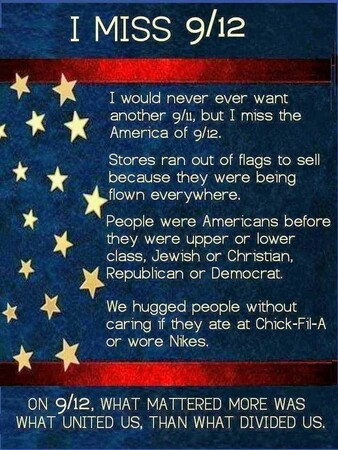As we've approached the twentieth anniversary of 9-11, I’ve seen this picture on social media a lot:
In some ways, I get the sentiment.
Our country is divided, certainly more than I’ve seen at any other point in my lifetime.
And yet, every time I’ve seen this picture, I’ve cringed.
Like so many others, I can tell you exactly where I was on 9-11. And as this picture suggests, I, too, remember how on 9-12, it felt like Americans who also happened to be white and Christian really did come together and proudly hang up their American flags.
But I also remember something else. When 9-11 happened, I was a senior in college, working as a Resident Advisor. As part of my job that day, I was asked to check on all the residents on my floor. Most communicated exactly what I’d felt that morning: Shock. Fear. Confusion. Horror.
One student, however, was different. She was Middle Eastern and when I checked on her - early in the afternoon of 9-11 - what I saw on her face was terror.
By that point in the day, narratives had already begun to emerge about the Middle Eastern terrorists who’d hijacked the planes.
When I asked my friend how she was doing, she said, “I’m afraid they’ll think I’m a terrorist too.”
I remember being horrified by her comment, enough so that twenty years later, I still remember it. But honestly, at that moment, I thought she was overreacting.
Unfortunately, over the next days, weeks, and even months, I watched as my friend’s fears came true. People DID think she was a terrorist. She’d sometimes come back and recount being called “Terrorist!” by random strangers on the quad.
As a white person with plenty of privilege, I wasn’t sure how to integrate her experience into the dominant narrative of unity that I was being told.
So, I largely didn’t. I could get by fine if I just ignored my friend’s discomfort and fear.
Twenty years later, I regret that.
Twenty years later, what’s striking to me about this picture is that it’s told from the perspective of white, Christian America. There’s no mention of race in the unity portrayed in this picture.
Maybe that’s because while whites united, people actively discriminated against Middle Easterners.
By the evening of 9-11, planes had stopped crashing into buildings and the sky had grown eerily quiet. My sense of fear was largely gone.
But my Middle Eastern friend’s terror was only beginning.
So, on this twentieth anniversary of 9-11, most of what I’ve felt today is lament.
I feel deep sorrow for those who were killed on 9-11.
I feel deep sorrow for those killed in the war in Afghanistan over the last twenty years.
I feel deep sorrow for the Afghan refugees created by this war.
I feel deep sorrow for Middle Eastern Americans and Muslim Americans who were targeted and discriminated against in the aftermath of 9-11.
And I feel deep sorrow for how, twenty years later, many white, Christian Americans still can’t seem to see or acknowledge a world that’s bigger than us.
